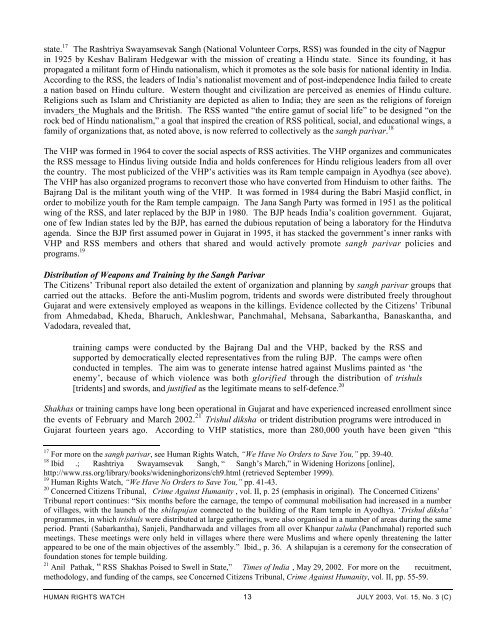We Have No Orders to Save You - Human Rights Watch
We Have No Orders to Save You - Human Rights Watch
We Have No Orders to Save You - Human Rights Watch
Create successful ePaper yourself
Turn your PDF publications into a flip-book with our unique Google optimized e-Paper software.
state. 17 The Rashtriya Swayamsevak Sangh (National Volunteer Corps, RSS) was founded in the city of Nagpur<br />
in 1925 by Keshav Baliram Hedgewar with the mission of creating a Hindu state. Since its founding, it has<br />
propagated a militant form of Hindu nationalism, which it promotes as the sole basis for national identity in India.<br />
According <strong>to</strong> the RSS, the leaders of India’s nationalist movement and of post-independence India failed <strong>to</strong> create<br />
a nation based on Hindu culture. <strong>We</strong>stern thought and civilization are perceived as enemies of Hindu culture.<br />
Religions such as Islam and Christianity are depicted as alien <strong>to</strong> India; they are seen as the religions of foreign<br />
invaders_the Mughals and the British. The RSS wanted “the entire gamut of social life” <strong>to</strong> be designed “on the<br />
rock bed of Hindu nationalism,” a goal that inspired the creation of RSS political, social, and educational wings, a<br />
family of organizations that, as noted above, is now referred <strong>to</strong> collectively as the sangh parivar. 18<br />
The VHP was formed in 1964 <strong>to</strong> cover the social aspects of RSS activities. The VHP organizes and communicates<br />
the RSS message <strong>to</strong> Hindus living outside India and holds conferences for Hindu religious leaders from all over<br />
the country. The most publicized of the VHP’s activities was its Ram temple campaign in Ayodhya (see above).<br />
The VHP has also organized programs <strong>to</strong> reconvert those who have converted from Hinduism <strong>to</strong> other faiths. The<br />
Bajrang Dal is the militant youth wing of the VHP. It was formed in 1984 during the Babri Masjid conflict, in<br />
order <strong>to</strong> mobilize youth for the Ram temple campaign. The Jana Sangh Party was formed in 1951 as the political<br />
wing of the RSS, and later replaced by the BJP in 1980. The BJP heads India’s coalition government. Gujarat,<br />
one of few Indian states led by the BJP, has earned the dubious reputation of being a labora<strong>to</strong>ry for the Hindutva<br />
agenda. Since the BJP first assumed power in Gujarat in 1995, it has stacked the government’s inner ranks with<br />
VHP and RSS members and others that shared and would actively promote sangh parivar policies and<br />
programs. 19<br />
Distribution of <strong>We</strong>apons and Training by the Sangh Parivar<br />
The Citizens’ Tribunal report also detailed the extent of organization and planning by sangh parivar groups that<br />
carried out the attacks. Before the anti-Muslim pogrom, tridents and swords were distributed freely throughout<br />
Gujarat and were extensively employed as weapons in the killings. Evidence collected by the Citizens’ Tribunal<br />
from Ahmedabad, Kheda, Bharuch, Ankleshwar, Panchmahal, Mehsana, Sabarkantha, Banaskantha, and<br />
Vadodara, revealed that,<br />
training camps were conducted by the Bajrang Dal and the VHP, backed by the RSS and<br />
supported by democratically elected representatives from the ruling BJP. The camps were often<br />
conducted in temples. The aim was <strong>to</strong> generate intense hatred against Muslims painted as ‘the<br />
enemy’, because of which violence was both glorified through the distribution of trishuls<br />
[tridents] and swords, and justified as the legitimate means <strong>to</strong> self-defence. 20<br />
Shakhas or training camps have long been operational in Gujarat and have experienced increased enrollment since<br />
the events of February and March 2002. 21 Trishul diksha or trident distribution programs were introduced in<br />
Gujarat fourteen years ago. According <strong>to</strong> VHP statistics, more than 280,000 youth have been given “this<br />
17 For more on the sangh parivar, see <strong>Human</strong> <strong>Rights</strong> <strong>Watch</strong>, “<strong>We</strong> <strong>Have</strong> <strong>No</strong> <strong>Orders</strong> <strong>to</strong> <strong>Save</strong> <strong>You</strong>,” pp. 39-40.<br />
18 Ibid .; Rashtriya Swayamsevak Sangh, “ Sangh’s March,” in Widening Horizons [online],<br />
http://www.rss.org/library/books/wideninghorizons/ch9.html (retrieved September 1999).<br />
19 <strong>Human</strong> <strong>Rights</strong> <strong>Watch</strong>, “<strong>We</strong> <strong>Have</strong> <strong>No</strong> <strong>Orders</strong> <strong>to</strong> <strong>Save</strong> <strong>You</strong>,” pp. 41-43.<br />
20 Concerned Citizens Tribunal, Crime Against <strong>Human</strong>ity , vol. II, p. 25 (emphasis in original). The Concerned Citizens’<br />
Tribunal report continues: “Six months before the carnage, the tempo of communal mobilisation had increased in a number<br />
of villages, with the launch of the shilapujan connected <strong>to</strong> the building of the Ram temple in Ayodhya. ‘Trishul diksha’<br />
programmes, in which trishuls were distributed at large gatherings, were also organised in a number of areas during the same<br />
period. Pranti (Sabarkantha), Sanjeli, Pandharwada and villages from all over Khanpur taluka (Panchmahal) reported such<br />
meetings. These meetings were only held in villages where there were Muslims and where openly threatening the latter<br />
appeared <strong>to</strong> be one of the main objectives of the assembly.” Ibid., p. 36. A shilapujan is a ceremony for the consecration of<br />
foundation s<strong>to</strong>nes for temple building.<br />
21 Anil Pathak, “ RSS Shakhas Poised <strong>to</strong> Swell in State,” Times of India , May 29, 2002. For more on the recuitment,<br />
methodology, and funding of the camps, see Concerned Citizens Tribunal, Crime Against <strong>Human</strong>ity, vol. II, pp. 55-59.<br />
HUMAN RIGHTS WATCH 13 JULY 2003, Vol. 15, <strong>No</strong>. 3 (C)

















